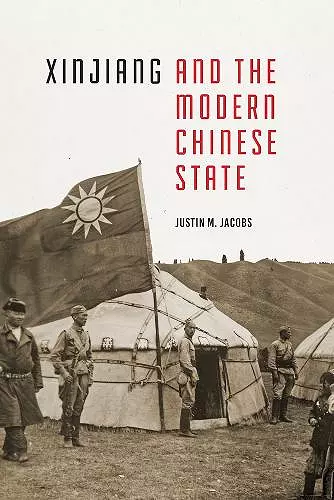Xinjiang and the Modern Chinese State
Format:Paperback
Publisher:University of Washington Press
Published:1st Sep '17
Currently unavailable, and unfortunately no date known when it will be back
This paperback is available in another edition too:
- Hardback£107.95was £107.95(9780295743219)

Xinjiang and the Modern Chinese State adds important new material and frames our understanding of this period of Xinjiang history. It will revise approaches to Nationalist China in general and help us compare the politics of minority ethnonationalism in post-1949 China with the similar but distinct Soviet approach. -- James Millward, author of Eurasian Crossroads: A History of Xinjiang Adds to our knowledge of the region's history and argues for placing China's ethnically distinct borderlands at the forefront of China's modern history. -- Linda Benson, author of China since 1949 With the publication of Justin M. Jacobs's Xinjiang and the Modern Chinese State, our understanding of the dynamics between Han and non-Han within the late Chinese empire (the Qing / Manchu Dynasty, the Republic of China, and the People's Republic of China) makes a quantum advance in sophistication and precision. -- Victor Mair, University of Pennsylvania
Open-access edition: DOI 10.6069/9780295806570
Xinjiang and the Modern Chinese State views modern Chinese political history from the perspective of Han officials who were tasked with governing Xinjiang. This region, inhabited by Uighurs, Kazaks, Hui, Mongols, Kirgiz, and Tajiks, is also the last significant “colony” of the former Qing empire to remain under continuous Chinese rule throughout the twentieth century. By foregrounding the responses of Chinese and other imperial elites to the growing threat of national determination across Eurasia, Justin Jacobs argues for a reconceptualization of the modern Chinese state as a “national empire.” He shows how strategies for administering this region in the late Qing, Republican, and Communist eras were molded by, and shaped in response to, the rival platforms of ethnic difference characterized by Soviet and other geopolitical competitors across Inner and East Asia.
This riveting narrative tracks Xinjiang political history through the Bolshevik revolution, the warlord years, Chinese civil war, and the large-scale Han immigration in the People’s Republic of China, as well as the efforts of the exiled Xinjiang government in Taiwan after 1949 to claim the loyalty of Xinjiang refugees.
"This book provides timely and highly valuable research on the long roots of China's relations with Xinjiang, situating today's tension and conflicts within a sweeping historical context. . . . Essential."
* Choice *"Jacobs explains better than any other previous scholar how the ‘empire of nations’ that is the modern PRC emerged from the colonial rule of the Qing dynasty and the politics of accommodation of Republican China on the frontiers."
-- Peter C. Perdue * Cross-Currents: East Asian History and Culture Review *"This nicely conceived, thoroughly researched, thoughtful, and well-written book is a must-read for anyone interested in ethnicity in China."
* Journal of Asian StudiISBN: 9780295742649
Dimensions: unknown
Weight: 431g
320 pages